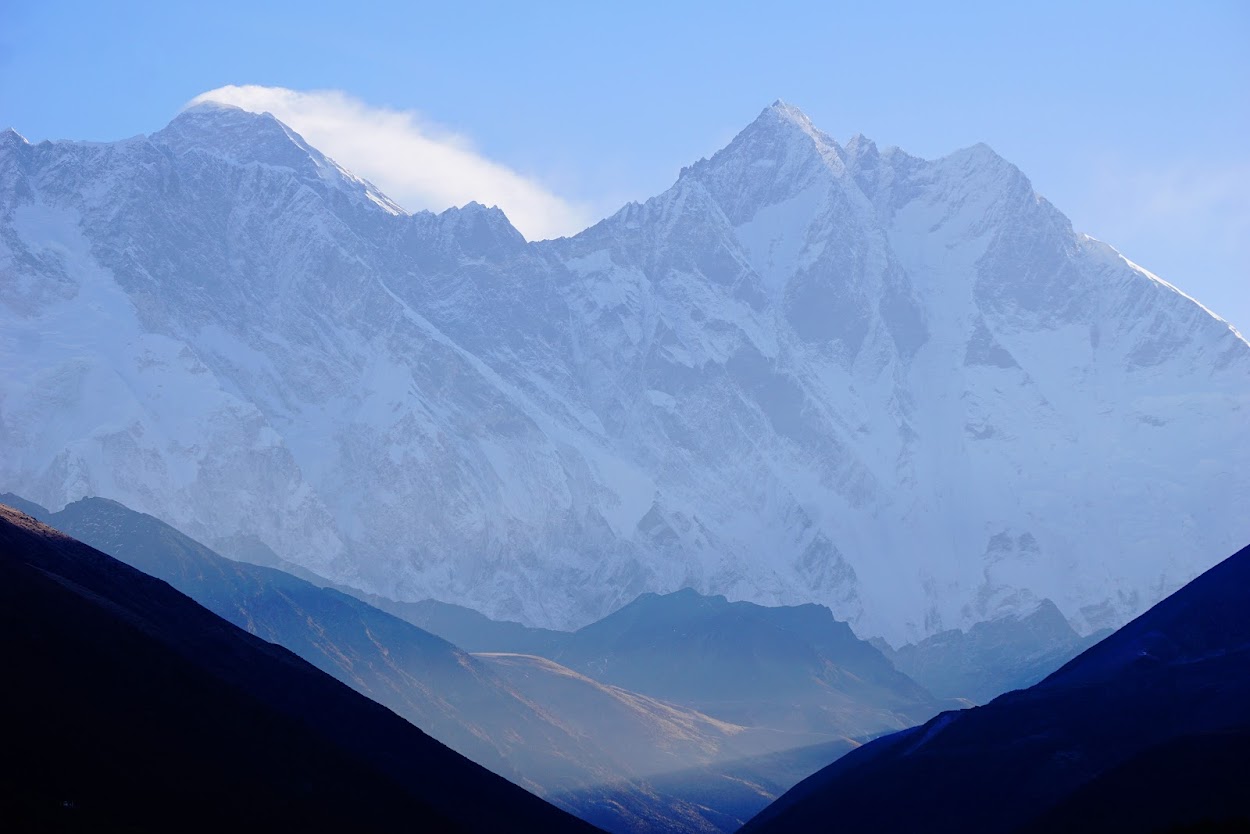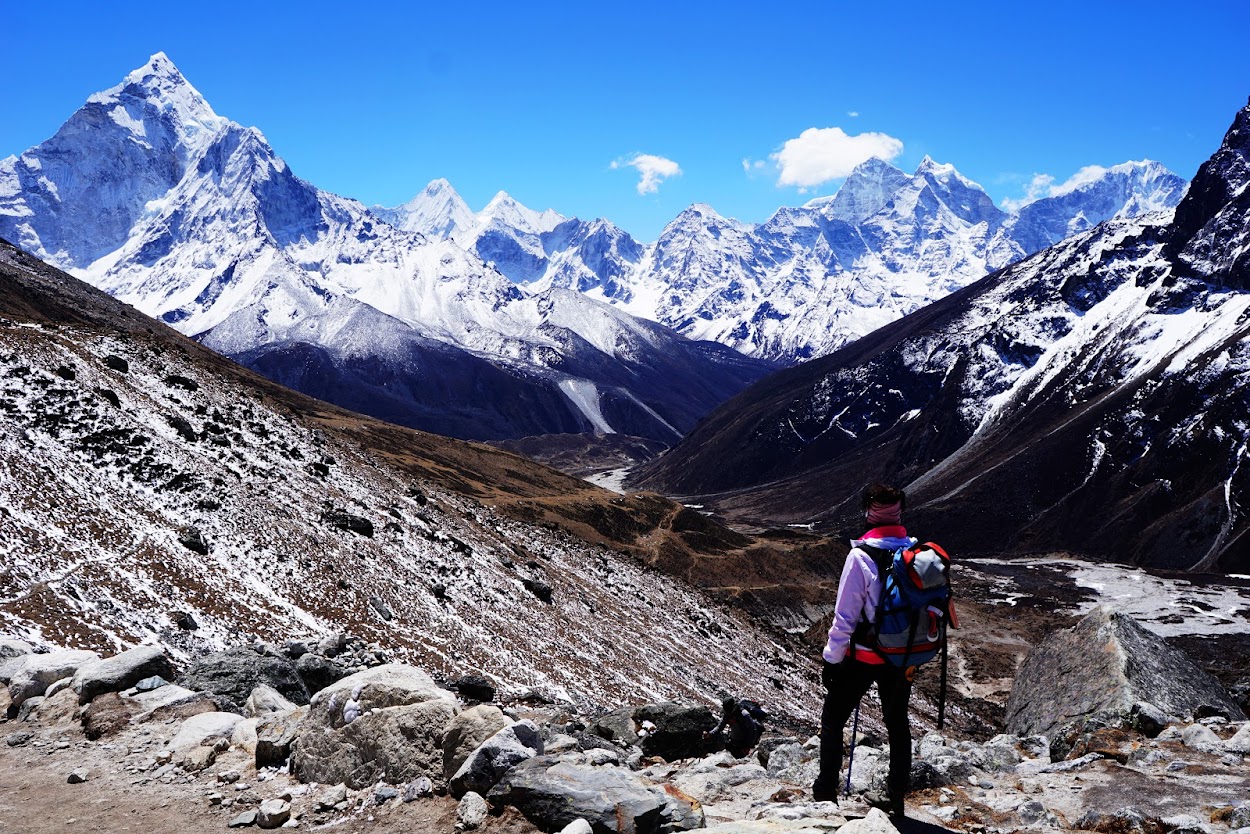'A horse of a different color'. After a snow day we return to enjoy the sunset.

And it was serene and calming.

The yaks keep on going...what a life.

Jen on the outside, climbs a tough one. Sometimes you can feel another's strain and pain.

Would we ever have thought we'd be sitting in Kathmandu, watching a storm with flashes of blue light bathing the night sky and illuminating the tall buildings close-by and surrounding mountains in the distance while rain washed the dusty roads clean or at least, made them less dirty than they were hours earlier. Since returning to this unusual but colorful city from the high-mountains, we've been able to rest, slow our pace to a level I cannot recall in a long while. We exercise vigorously on most days of the year but over the last couple, a climb to the 5th floor apartment, a few times per day, is it. I have not felt less guilty about our inactivity ever before; perhaps when Jenni gave birth to our 3 children might be the exception.
By the way, although Kathmandu is at low altitude, it's surrounded by, in our opinion, high mountains. Talking of height, the definition of mountain in some circles within the community is one that reaches at least 5,000 meters or 16,500 feet. Anything less is a hill. This, of course, means that within the contiguous United States, no mountain exists. Sound arrogant? Not when spoken by a Nepalese guide, porter or Sherpa.
That aside, each day we have to remind ourselves where we are because it is a combination of a dream, tough reality and another learning experience. There are so many places in the world which indicate to us what life must have been like in the centuries past. The only thing interfering with this thought is the prevalence of hand-held gadgets—technological marvels, a social curse. The simple life, yes, without some of the wonderful luxuries, has an appeal. It's amazing what little a person requires to survive. It's even more astounding to consider how much we have of material possessions which only make a marginal contribution toward our lives, if at all. Somewhere stored away we have at least 5 smart-ware crockery sets, maybe more. Does five of those make us more content than only four or two? It's embarrassing.
If nothing else, over the past nine years, we have realized the advantage of the tight-shoe syndrome. You know the good feeling experienced after removing a pair of uncomfortable shoes. In a slightly different vein, we find we need to change our environment vertically, going from relative luxury to less comfortable circumstances so that when we return from a trip, especially one that's a little rough, we appreciate our comforts so much more. It seems we take things for granted too often. It also means that simple things become quite luxurious in of themselves. Who needs to seek higher pleasures when simple things are wonderful?
A long time ago, I realized that the world's population is not separated by 'apartheid' in the racial sense but rather, the chasm is more akin to socio-economic reasons. We've met so many people over the years, mostly the poorer classes, and it's clear that we all have so much in common. Fear, hope, care, love, influences, desires, children, aspirations and more which don't differ all that much amongst the world's inhabitants. Homo sapiens does not present major surprises in its needs. However, what is vastly different are the economic circumstances, varying degrees of education and exploitation by the ruling classes. Nepal is another country where the opportunities for growth of the individual are limited. Of course, that's another complicated story but I can't help thinking how critical it is not only to be born to the right parents but also be in a land of opportunity. How sad it is to realize to get ahead a person should consider selling his/her labor in Dubai for a mere pittance rather than at home. And as we have mentioned before, those who do work at home, at least many of them, work by bearing great burdens on their backs as they trudge up-and-down the mountains.
Whilst I strongly believe in the free-market system and notice how efficient it is when left to function independently, I no longer believe there is an all encompassing economic system, especially one that is or will be constantly hammered and hampered by politicians, (not left to operate independently), that can cater for the bulk of the world's expanding populace. I'm left with only one question as we witness so much poverty and misery, an enormous disparity in living standards.
It's a big question and we decided not to ask it in this forum.
In order to end on a lighter note, we thought of an idea which is still in its infancy but could raise a lot of money for Nepal but at a cost of its mountain purity. Can you imagine how the Swiss are drooling at their mouths with the thought of building a cableway to Everest? It has to be the ultimate scoop for the them. And if not Everest, any number of many other peaks will probably do. How about Ama Dablam? Just imagine the Swiss running cars to these peaks. They'd gladly pay rentals in the billions. Perhaps the French and Italians might join the consortium.
The powerful forces above, the town below accepting what the mountains distribute.

Monasteries and temples abound. The beauty of it is that the local people show more respect than in most places we've visited.

At 6am., the yaks pass our hotel (behind me)...hut...shack, well you name it, unlike the structure in the picture.

Shadows and shine at the base of Mount Everest...nearly always with the wisp of cloud in the same format.

While everything in Texas may be bigger and better, taller (higher) it's not.

The helicopters either bring in supplies, tourist excursions or handle rescues. They keep busy with a rescue at '$5,000 a pop'.

Jen sits above Everest Base Camp, perhaps a little under 18,000 feet.

Love it...a sight from Kala Patther, a peak above base camp.

Out and about base camp with a dumb hood.

On the way home, another 4 days to go.

Cheers,
Jenni and Jeffrey
I speak a little Nepalese as you can see. This is outside the airport we were diverted to which added a 5-hour bus ride to the journey back to Kathmandu.

No comments:
Post a Comment